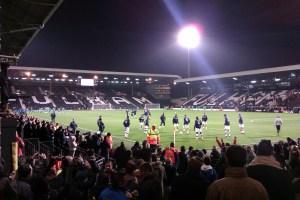Being the city that London is, and with its wide variety of nationalities contained therein, it’s not much of a surprise any more that more internationals are being played here and you can be guaranteed that when one of these takes place, the Daggers Diary team will be there.
Last month, Dagenham Dan and I traipsed across London to watch Australia v Canada at Craven Cottage. While others were watching England beat Poland at Wembley, we were getting cold down by the Thames watching the green and gold easily defeat a spirited but inferior Canadian team.

For both (and indeed, all) teams taking part next summer, this will be one of the last opportunities to have a look at their team before the month of wall to wall football kicks off. With one international date in March, and then probably two just before the tournament, any player wanting to make an impression on the coach of their national team doesn’t have that long left. It may even be that players will be going to the World Cup with no international experience at all. While that may not be a bad thing, a quick look at England’s defeat to Chile last Friday shows that it isn’t always desirable.
Monday 18th November 2013, Italy v Nigeria, Craven Cottage
For many, these two teams bring back memories of a World Cup encounter in 1994. The Super Eagles of Nigeria (including Finidi George, Jay Jay Ockocha and Daniel Amokachi among others) led Italy for so long, until the Divine Ponytail himself, Roberto Baggio scored two (the first to take the game to extra time) and ensured progress for the Europeans, while Nigeria made their way to the airport, having won plenty of admirers for their play. A search through the FIFA archives shows that the game in Boston on July 5th 1994 is the only meeting between the countries so far, which was also notable for a red card for Gianfranco Zola.
A month ago, there was a subtle mist as we approached the stadium for that Australia game. Tonight, the mist has gone, but there is a drizzle in the air that might not be repeated in Brazil. Another difference from last month was that, as we approached the stadium with an hour to go before kick off, there was hardly anyone around; tonight, there are plenty of stewards, lots of police and Stevenage Road is heaving with people milling around before entering the stadium.
Dagenham Dan and I have positioned ourselves in the Hammersmith End, with the Italian fans. As we enter the stadium, there is another row of stewards ready to check bags. Dan’s subway sandwich is the discussion point at this juncture, as food isn’t allowed in the ground, although the same stewards aren’t quite as vigilant later on, as several beers are bought back through to the seats. The contraband sandwich is allowed through, and we take our seats. Before the game starts though, the stewards are swamped with people having trouble finding their seats. In all too short a time, both of us are directing people to their allocated block, although it is becoming a “sit where you like” event.
The teams emerge, and make their way over to the Riverside Stand for the national anthems. The Nigerian one is first, and their fans at the opposite end of the ground do themselves proud with their rendition. Then the Italian anthem strikes up, and the whole of our stand is on it’s feet, and singing along. It’s an impressive sound and the Italian team, clad in all white, will be attacking the Hammersmith End first.
During the warm up, every time Mario Balotelli ventured near to the touchline, it was almost like being transported back to David Beckham doing his warm up during his last few England appearances. Mobile phones in hand, pictures were being taken every time he jogged into view. Now that the game has begun, he is up front, being supported from slightly further back by Guiseppe Rossi. The Italians start the game in the ascendancy, and go in front after just twelve minutes. Both Balotelli and Rossi are involved; Balotelli is able to hold the ball up before slipping a pass through for Rossi. Confronted with a goalkeeper rushing out to narrow any sight of goal, he is able to chip/scoop the ball over the keeper and give the “home” team the lead. From our one view of it, it doesn’t look like a clean strike of the ball, but it crosses the line nonetheless.
For the first thirty minutes, Italy are dominant. The midfield is being controlled by the impressive Riccardo Montolivo, and the Nigerians look like they are going to be in for a long evening. At this stage, it appears to be only a matter of time before the Italians are on the scoresheet again.
Naturally then, it’s Nigeria who score next. They start to finally get a foothold in the game around the half hour, and the time and space that the Italians had enjoyed in midfield starts to disappear. Now, there are spaces down the right hand side of the Italian defence, and it is from this area that chances will be created for the Nigerians to score twice in quick succession.
First, Shola Ameobi is able to cross from that side of the pitch to the back post, where Dike is able to head home. There are claims of a foul on the Italian defender, but these are waved away by the referee, Martin Atkinson.
If that cheered up the Nigerian fans at the other end of the ground, then four minutes later, they were even more pleased. Once again, they had got a cross in from the left, but this time, Ameobi was on the end to score at the near post. This has the effect of totally silencing the Hammersmith End, but the Putney End is going nuts, as is a group of Nigerian fans near us in the Johnny Haynes stand; they rush forward at each goal, clambering over rows of seats to celebrate.
Nigeria are, on the balance of play, slightly fortunate to be ahead at the break, but they have taken their chances well. Now the Italians have to respond.
The only player on the Italian team to get a louder cheer than Mario is Andrea Pirlo (or should that be Purr-lowe?). He is warming up at the interval, and although he is not bought into the game straight away, he eventually gets on with the score at 2-2.
The second half has started in much the same way as the first, with the Italians on the attack. It doesn’t take them quite as long to score though, as just a couple of minutes in, Giaccherini is granted the freedom of Craven Cottage to control a pass by Candreva pass and deposit the ball past Ejide.
At this stage, I expected Italy to really push on for the winner, which they did. Replacing Montolivo with Pirlo meant that the captains armband switched to the incoming player, and I can only recall him giving the ball away once in the time he was on the park. Italy hit the woodwork twice, through Parolo and Diamanti, but it wasn’t all one way traffic.
Despite the slow start, Nigeria were by now in full swing as well, and it was end to end stuff. Having been to (and watched on tv) enough friendly games to bore the pants off of even the most hardened football watcher, this was a pleasant change. Looking back on it now, it’s slightly puzzling that it ended 2-2, when there were chances for both to add to their respective tally.
When the referee brings the game to it’s end, there is a quick exit for some, while others wait to applaud both sides for what has been a thoroughly entertaining evening. We’ve learnt that Italy look quite good going forward, and with the Rossi / Balotelli combination, could cause a few problems next summer, especially if Pirlo is still there to provide the chances. Defensively, this wasn’t a vintage Italian side, but then again, they are certainly more attack minded than teams of the past. Although it’s only one game, if they get into their stride in Brazil, Italy could be a reasonable bet for the last four.
For Nigeria, it’s a bit more difficult. It is to be hoped that the team (and management) that got them to Brazil will be given the chance to perform at the tournament. Too often in the past, African teams have qualified, only to be seduced by the “glamour” of having a European or South American coach take over for the final competition. It’s not necessary, and hopefully Stephen Keshi will be given the chance to take his team to Brazil. Qualification for the knock out phase should be their target; anything after that should be viewed as a bonus.

